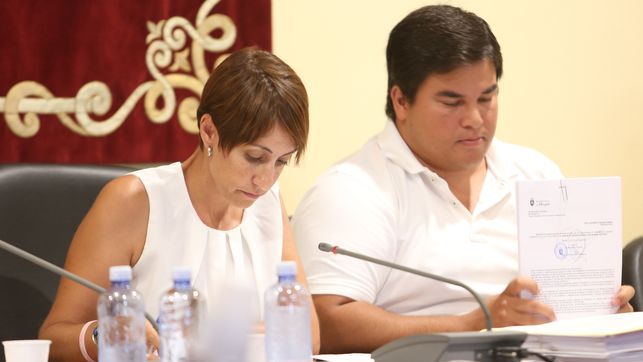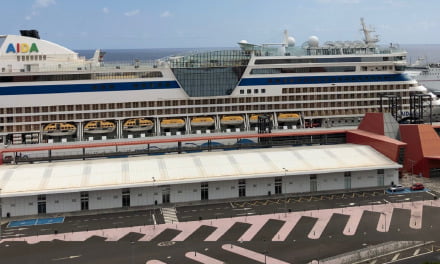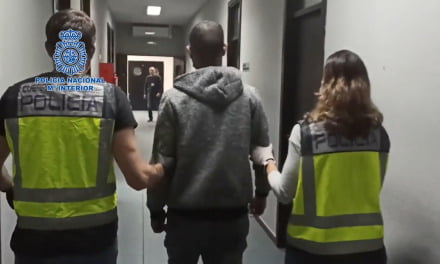La Alcaldesa, O. Bueno, was called on Thursday, before the judge, to defend why she ordered her IT manager to stop Guardia Civil access to town hall computers after her arrest, not for the first time, back in September 2020. The case is just one of the several derived from the latest round of allegations, which came to light after the 2015 local elections, accusing her and her people of dodgy dealing and electoral fraud, having been accused of orchestrating a vote buying plot with a local business man who materially benefitted from the relationship, both financially and in terms of municipal service contracts. The the original case had to be shelved, as the investigation ran out of time to bring charges under Spain’s statutes of limitations, in essence a technicality, but several other investigations have continued through the courts.
The mayoress of the South West Gran Canaria municipality of Mogán, La Alcaldesa Onalia Bueno, along with her number two, Mencey Navarro, both from much scrutinised Ciudadanos por el Cambio (CIUCA) party, on Thursday set foot once again in the courts of San Bartolomé de Tirajana to testify in the investigation against them, writes Ivan Suarez in the independent news portal CanariasAhora.
The original case had to be filed, back in March, for having run out of time to prosecute due to Spanish law only allowing a certain amount of time before any detected crime becomes prescribed, meaning it can no longer be prosecuted, focused on the events that originally occurred in 2015. There was subsequently insufficient evidence to show an ongoing crime in 2019, so that later set of allegations were temporarily shelved also. However, several derivative cases are still alive in the courts.
La Alcaldesa and her First Deputy, who also serves as councillor for Urban Planning (among his various other roles) appeared on Thursday before the head of the Court of Instruction 2 as defendants in proceedings 960/2022, which form the judicial investigation of an instruction to block remote access by the Guardia Civil, preventing them from seeing administrative files on the town hall computer systems, after they carried out a court order to search the municipal offices on September 17, 2020. Bueno, Navarro and also councillor for Social Services Tania del Pino Alonso were all arrested in that operation carried out by the Guardia Civil in search of of documentation relating to crimes that were, up until then, being secretly investigated at that time (alleged crimes including electoral, prevarication, bribery and embezzlement).
As with the rest of the various cases against Bueno, the origin of this procedure was a report from the judicial police team. In it, investigators collected the statement given by the head of the IT services and WhatsApp messages exchanged with the accused. During investigative search and registrations at the municipal offices, while the mayoress and town councillors were put under arrest, agents from the Guardia Civil’s Technological Investigation Team, in collaboration with the IT official, uploaded a backup copy of the municipal files to a server so as to be able to access them remotely. They did so due to the impossibility of simply exporting the documentation on external hard drives or of physically seizing the municipal servers, since this would have paralysed the activities of the administration at the town hall.
 However, days later, on October 1, Onalia Bueno and Mencey Navarro met with the person in charge of the IT at the request of the mayoress. At that meeting, according to the investigators’ report, they ordered the official to disconnect the remote control system from that server, arguing that the Guardia Civil might be able to access more documentation than had been authorised by the judge.
However, days later, on October 1, Onalia Bueno and Mencey Navarro met with the person in charge of the IT at the request of the mayoress. At that meeting, according to the investigators’ report, they ordered the official to disconnect the remote control system from that server, arguing that the Guardia Civil might be able to access more documentation than had been authorised by the judge.
“Account disabled. As you have instructed me,” the municipal worker wrote to the mayoress and the first deputy around eleven in the morning that day, accompanying the message with a screenshot. Bueno only replied with a brief “ok”.
After executing the order they had given, the head of service contacted a Guardia Civil sergeant and informed him. Warned that this action could be committing a crime of obstruction of justice and/or against the public administration, the official contacted the mayoress once again: “Onalia, we have to talk. The Civil Guard has given me the order to re-enable the user [account]. If I do not do so, I will incur a crime of judicial disobedience and they can charge me with obstruction of justice.”
The public employee did not receive any response from La Alcaldesa, the leader of CIUCA (allied to the regionalist Coalición Canaria party), but did receive a response from Mencey Navarro, with whom she had two brief telephone conversations. In the first, Navarro maintained his position and insisted that the order to block access should be obeyed. However, 25 minutes later and after a consultation with his lawyers, he backed down and asked for access to be re-enabled.
The defendants allege that their actions were to prevent this remote control of municipal archives, by the investigators, claiming that it constituted a “general and indiscriminate intervention” into all the files held by the Mogán Town Council.
Unusual hiring of consultants
Thursday was the third time that O. Bueno has had to attend the courts of San Bartolomé de Tirajana to declare, as one of those being investigated, following the partial shelving of the alleged electoral crimes case. On June 7, she appeared in the Court of Instruction 1 , where two other separate cases fell, an investigation into alleged procedural rigging to benefit a businessman whom the researchers identified as a financier of CIUCA in the 2015 elections, and one investigating the questionably hiring of two municipal advisers.
Proceedings 1205/2022 were initiated in May of last year. The mayor and her number two are accused of allegedly having engineered a fictitious agreement in a judicial mediation process with businessman Luis Oller, president of Aguas de Arguineguín, himself also under investigation and a concessionaire for part of the water supply service in the municipality, as well as bring the administrator of real estate developer Cornisa del Suroeste, with whom there was an outstanding financial dispute when CIUCA claimed their 2015 local election victory.
The Civil Guard investigators maintain that this process was rigged by the mayor, Mencey, the Town Planning councillor, and by the official Salvador Álvarez, to favor the interests of the businessman, at the expense of the public treasury, allegedly as a compensation for his suspected contributions to CIUCA in the 2015 campaign, unseating the incumbent Paco Gonzalez (PP) who was at the time also under investigation.
The declarations by those defendants under investigation, initially scheduled for June 7, was suspended and ended up being held thirteen days later, on June 20, without the presence of the prosecutor, who did not attend the appointment, and without a formal prosecution accusation, as the judge would only accepted the appearance of the opposition party councillor, Nueva Canarias (NC) Isabel Santiago, if she deposited a bail of €6,000. In that appearance, O Bueno claimed that during the procedure to resolve old lawsuits between the Town Council and Luis Oller’s companies, she had limited herself to proposing mediation and attending the first sessions and that, from that moment, she left everything in the hands of municipal technicians. Mencey Navarro, for his part, maintained that he only attended two of the ten meetings held.
Before CIUCA unexpectedly rose to power in Mogán, the businessman had demanded unpaid bills worth €853,415.27 from the Town Council, for gardening and street cleaning services. The administration, for its part, had demanded from his company Cornisa del Suroeste (in execution of a final court judgment) payment of €1.35 million to take charge of deficient works in an urbanisation built by the promoter. Finally, and despite various discrepancies expressed by two lawyers, who ended up being removed from this process, the litigation was resolved with a favourable balance of nearly €900,000 for Luis Oller’s companies.
O Bueno and Mencey Navarro, and Luis Oller, requested the proceedings be dropped after giving their statements. The Prosecutor’s Office opposed this claim, arguing that it was not “the opportune procedural moment.”
Another active investigation, 1204/2022, in which the mayoress and her team have been investigated, involves two advisers to the Town Council. One Raico Guerra, who also participated in the 2019 elections as a CIUCA candidate and who, not having not obtained a councillor’s mandate, was instead appointed as trusted advisory staff in different area, including urban planning, just days after selling his shares in a family business, Arpiplan, which had been a contractor for the Town Council’s health services since 2015. Investigators estimated the municipal funds received from Guerras activities over five years (until 2020) stood at around €276,000 through instalment contracts. The judicial police found that there was a “manifest intention” to benefit the advisor.
A second advisory role that came under scrutiny, that of architect Jesús Romero Espeja, who was previously Coalición Canaria‘s (CC) Deputy Minister for Territorial Policy when they were in power as the Regional Government of the Canary Islands, investigated his having been hired by the Mogán Town Council as advisor on Urban Planning, just a few days before. This case is investigating whether minor contracts for the same purpose were split up in order to avoid “advertising and competitive competition rules.” meaning that the work would not have to be subject to the public tendering process. His lawyer also requested these proceedings be dropped.
Security Bonds to testify as part of “popular action” from the prosecutor’s office
The Nueva Canarias (NC) councillor, Isabel Santiago, currently in opposition, served as the primary accuser in the initial case on the electoral rigging, and also asked to appear in those three separate cases derived from it.
San Bartolomé de Tirajana’s Court of Instruction 2, related to the blocking of the Civil Guard’s access to electronic documentation, has not yet answered this request.
Yet, the magistrate at the Court of Instruction 1, of the judicial district of the south of Gran Canaria, has done so in the two other procedures that she has assumed (alleged rigging to favour a businessman and the irregular hiring of two advisers), but her decision, despite both cases having the same origin, has not been the same.
In proceedings 1204/2022, that of the advisors, in June the NC councillor was allowed to appear, as part of the public prosecutor’s action without requiring any bail. However, in 1205/2022, which investigates the “fictitious agreement” with CIUCA’s alleged financier in a suspect electoral campaign, the judge imposed a security bail of €6,000 to be able to be part of the procedure, a decision that has been appealed by Santiago and is awaiting a pronouncement. Presumably the magistrate is conscious of the potential for counter allegations against the opposition councillor suggesting political motivations for her testimony.
The change of position of the prosecutor, Lucía Cascales, in the case of the advisers, back in June supported the appearance of the NC councillor as part of a popular [public prosecution] accusation, however, recently, she has been focused on the result of the appeal presented by Onalia Bueno’s expensive Madrid lawyers, urging that bail be set for her accuser to exercise the right to testify, maintaining that Santiago is using criminal proceedings to “settle a political rivalry.”
The fourth separate case, ongoing, deals with salary increases granted to officials, including members of her own family, related to the mayor’s party and time in office.















